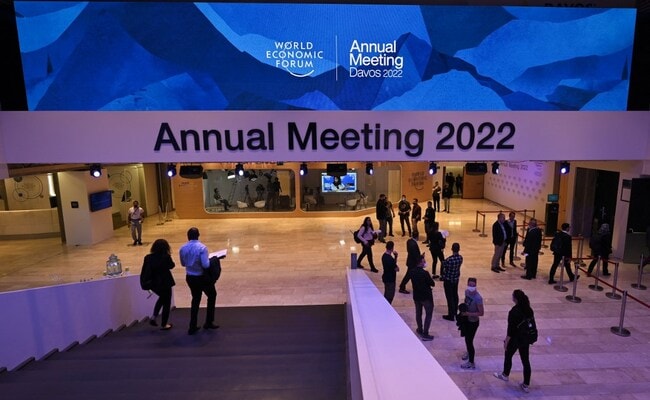World Economic Forum Davos Meet Returns; Focus On Ukraine, Climate Change

World Economic Forum: 50 heads of government or state are expected to attend the annual meeting at Davos.
Davos:
After a gap of nearly two-and-a-half years, Swiss ski resort town Davos is set to host the World Economic Forum Annual Meeting yet again with a host of global leaders including from India expected to deliberate over the Ukraine crisis, climate change and a host of other issues affecting the world.
The high-profile annual powwow of the rich and powerful from across the world will begin with a welcome reception on Sunday evening and will continue till Thursday, May 26.
Those scheduled to speak include Ukraine President Volodymyr Zelensky, European Commission President Ursula von der Leyen and German Chancellor Olaf Scholz, among a host of other world leaders.
From India, three Union ministers — Piyush Goyal, Mansukh Mandaviya and Hardeep Singh Puri — as well as several state leaders including two chief ministers — Basavraj S Bommai and Y S Jaganmohan Reddy — as well as KT Rama Rao from Telangana, Aditya Thackeray from Maharashtra and Thangam Thennarasu, along with several other public figures and a host of CEOs will be discussing key issues over the next six days here.
Overall, more than 50 heads of government or state are expected to attend the annual meeting, which generally takes place here in January when this small town is totally covered in snow, but this time it is happening during a sunny weather.
The annual meeting of 2021 could not take place physically, while the 2022 one had to be postponed due to the Covid pandemic.
The World Economic Forum (WEF) said the Annual Meeting 2022 will focus on ‘history at a turning point’, the theme of the summit.
The issues to be discussed include government policies and business strategies against a backdrop of the global pandemic, and the war in Ukraine and geo-economic challenges.
The meeting convenes at a strategic point where public figures and global leaders will meet in-person to reconnect, exchange insights, gain fresh perspectives and advance solutions.
The meeting’s overriding priority is to accelerate progress and make an impact in tackling global challenges and improving the state of the world, the WEF said.
After a two-and-a-half-year hiatus, the meeting will bring together nearly 2,500 leaders and experts from around the globe, all committed to the “Davos Spirit” of improving the state of the world.
Against the backdrop of deepening global frictions and fractures and a once-in-a-century pandemic, the unprecedented global context calls for purpose and resolve, and the meeting’s ambition is to rise to these challenges, the WEF said.
Over the past two years, the World Economic Forum said, it has strengthened its impact initiatives, which deal with issues ranging from COVID-19 and climate change to education as well as technology and energy governance.
These include the Reskilling Revolution, an initiative to provide 1 billion people with better education, skills and jobs by 2030; an initiative on universal environmental, social and governance (ESG) metrics and disclosures to measure stakeholder capitalism; and the 1 trillion trees initiative, 1t.org, to protect trees and forests and restore the planet’s ecosystems.
With the world at such a critical turning point, global business and government leaders need to work together to develop long-term policies and strategies that will revitalise the hard-hit global economy, strengthen the progress made to advance the Fourth Industrial Revolution and tackle the single greatest threat to humanity — climate change, said the WEF, which describes itself as an international organisation for public-private partnership.
“The Annual Meeting is the first summit that brings global leaders together in this new situation characterised by an emerging multipolar world due to the pandemic and war.
“The fact that nearly 2,500 leaders from politics, business civil society and media come together in person demonstrates the need for a trusted, informal and action-oriented global platform to confront the issues in a crisis-driven world,” said Klaus Schwab, Founder and Executive Chairman, World Economic Forum.
Cutting across the theme of the meeting are several priorities and issues that define the current moment and will shape the years to come.
The programme will focus on six thematic pillars. These include fostering global and regional cooperation; how to restore stability amid a new era of geopolitical conflict and tension as well as advancing trade, prosperity and partnerships; and securing economic recovery and shaping a new era of growth.
These also include how to stabilise the real economy and the financial system, while also determining the future of balanced growth, globalisation and development; and building healthy and equitable societies.
The leaders will also discuss how to move beyond the health emergency phase of the pandemic, rebuilding in its wake and strengthening health resilience for future threats as well as investing in good jobs, living wages, skills and education, not forgetting to redefine stakeholder capitalism for a new context.
Over 1,250 leaders from the private sector will be participating, along with nearly 100 Global Innovators and Technology Pioneers — the world’s most promising tech and business start-ups and scale-ups.
Civil society will be represented by more than 200 leaders from NGOs, social entrepreneurs, academia, labour organisations, faith-based and religious groups, and over 400 media leaders and reporting press.
The Annual Meeting will also bring together younger generations, with 100 members of the Forum’s Global Shaper and Young Global Leader communities participating.
(Except for the headline, this story has not been edited by NDTV staff and is published from a syndicated feed.)
Source link





